- Striving to Become an Open and Accessible University that Contributes to the Local Community
- Contributing to the local community by leveraging research and its results
- i-MOS Research Topics
- Topic 1 Joint research and development with local companies
- Research Topics of the Regional Policy Research Center’s Regional Cooperative
- Support for the Earthquake Disaster Reconstruction Efforts and Research of Reconstruction Issues
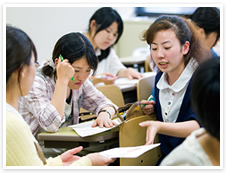 In order to realize our goal of contributing to the generation of vitality in the region, Iwate Prefectural University seeks, through efforts spearheaded by the Regional Cooperation Head Office, to provide learning opportunities to the citizens of Iwate, strengthen its function as a think tank and coordinate between industry, academia and government.
In order to realize our goal of contributing to the generation of vitality in the region, Iwate Prefectural University seeks, through efforts spearheaded by the Regional Cooperation Head Office, to provide learning opportunities to the citizens of Iwate, strengthen its function as a think tank and coordinate between industry, academia and government.
In the 2012 academic year, we utilized the “Center for the Development of Next Generation Mobility Technology that is Friendly to the Environment and the Local Community” program at i-MOS selected by the Ministry of Education, Culture, Sports, Science and Technology (MEXT) to promote joint research by industry and academia aimed at advancing manufacturing industries, such as the automotive industry, as well as the training of high-level engineers. In addition to training workshops for high-level engineers, we also initiated workshops and study groups for human resources training. (A total of 227 people attended these lectures.)
Additionally, based on a wide range of lifelong learning needs in the region, we conducted regional lectures and Iwate Prefectural University extension lectures at the Takizawa campus. Along with widely publicizing these lectures, we created and distributed a collection of reports on their contents. Among the regional lectures in the 2012 academic year, panel discussions and presentations of research results on the topic of earthquake reconstruction were held in Morioka, as well as Miyako and Kamaishi.
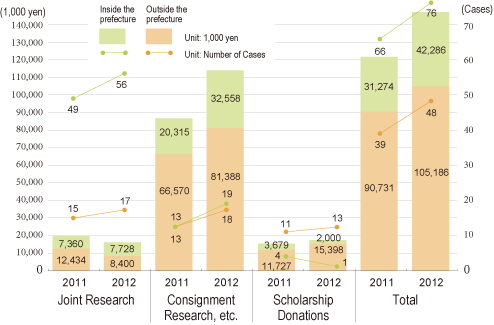 In the 2012 academic year, the results of our continued efforts so far to obtain external funding can be seen, and both the number of externally-funded research cases and the amount of funding increased. Joint research cases increased from 64 (19,794,000 yen) in the previous year to 73 (16,128,000 yen) in 2012, and funded research, etc., went from 26 cases (86,885,000 yen) to 37 cases (113,946,000 yen).
In the 2012 academic year, the results of our continued efforts so far to obtain external funding can be seen, and both the number of externally-funded research cases and the amount of funding increased. Joint research cases increased from 64 (19,794,000 yen) in the previous year to 73 (16,128,000 yen) in 2012, and funded research, etc., went from 26 cases (86,885,000 yen) to 37 cases (113,946,000 yen).
We have also been promoting the Wakate Younger Researchers Step-up Research Fund, established in 2011, while working to streamline selections. In the 2012 academic year, 19 people were selected for grants. Various efforts to contribute to the vitality of the region are being promoted such as the training of engineers and joint research by industry and academia using the MEXT selected “Center for the Development of Next Generation Mobility Technology that is Friendly to the Environment and the Local Community” program (with grants of about 50 million yen approved for the period of 2012-2016).
Furthermore, in the 2012 academic year we conducted 37 extension lectures at the Takizawa campus and the Aiina campus (located at the west entrance of Morioka Station), as well as in coastal regions such as Miyako and Kamaishi, in order to share research results with the citizens of Iwate. A total of 2,469 people attended the lectures.
|
|
The Iwate Monozukuri and Software Integration Technology Center (i-MOS) was established on April 1, 2011 with the aim of integrating the manufacturing industries’ base of software and hardware technology. Besides the 33 cases of joint research carried out so far with businesses using university research funding, there has also been research utilizing external funding such as A-STEP and the use of facilities and equipment for independent product development by companies.
The following 9 cases were selected as research topics of the Iwate Monozukuri and Software Integration Technology Center (i-MOS) for the 2013 academic year.
| No. | Research Representative | Research Topics | Faculty |
|---|---|---|---|
| 1 | SHIBATA Yoshitaka | A study of the practical applications of a car-mounted omnidirectional image transfer system with transmission activation controllable by Radio on Demand functionality | Faculty of Software and Information Science |
| 2 | INOMATA Toshimitsu | Implementation method of source code visualization for the quality improvement of automotive software | Faculty of Software and Information Science |
| 3 | ARAI Yoshikazu | Image projection system for visibility improvement of the environment in front of a vehicle | Faculty of Software and Information Science |
| 4 | Goutam Chakraborty | Proposal for an efficient delivery method of evacuation center and evacuation route information to evacuation vehicles based on RSU2V and V2V transmissions | Faculty of Software and Information Science |
| 5 | Prima Oky Dicky | Practical application of a safe-driving support system using information about the vehicle’s motion and the driver’s head position and line of sight | Faculty of Software and Information Science |
| 6 | DOI Akio | Research and development of a three-dimensional-based preoperative planning support system for osteotomy | Faculty of Software and Information Science |
| 7 | SAITO Yoshia | Study of emotion-sharing technology to achieve a human-friendly motorized society | Faculty of Software and Information Science |
| 8 | SAWAMOTO Jun | Proposal for a simple seismograph system using a smartphone equipped with acceleration sensors | Faculty of Software and Information Science |
| 9 | FUJITA Hamido | Construction of a traffic-accident prevention system for an aging society using mental cloning | Faculty of Software and Information Science |
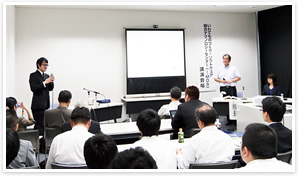
Research presentations on next-generation mobility research and development
(Iwate Prefectural University Presentation of Research Results, September 2013)
In collaboration with Iwate’s industry, academia, government and financial institutions, Iwate Prefectural University has started taking steps, through the Regional Innovation Strategy Program adopted in 2012 (MEXT project), aimed at the development of region where the automotive manufacturing industry has an eye to the future and will achieve sustainable innovation.
At Iwate Prefectural University, we are making efforts to maximize our potential such as inviting researchers from other regions and carrying out research and development on next-generation mobility. We are also working on the development of technologies with the cooperative efforts of our teaching staff.
Moreover, with the placement of coordinators, we are maintaining a system that supports and accelerates the new technological developments of next-generation mobility, and advancing the deployment of our research and development results in local businesses.
Furthermore, in order to systematically train engineers with knowledge of both manufacturing and software, we are implementing an advanced engineering training program for engineers and students and initiating human resources development.
Through this and other programs at Iwate Prefectural University, we are actively supporting reconstruction by promoting industry.
At Iwate Prefectural University, where one of our fundamental aims is “practical science and practice-oriented education and research”, we have set up the Regional Policy Research Center in order to further reinforce think-tank functionality for citizens. Confronting the needs and challenges of the people of Iwate from a regional point of view, researchers from a variety of disciplines have been conducting research to resolve local issues in collaboration with local governments as well as NPOs and businesses.
● Local Community Proposition Type (First Term)
Iwate Prefectural University, having researchers in a variety of disciplines, receives proposals on the challenges facing local groups (public bodies such as prefectural and municipal governments, community organizations, NPOs, businesses and so on) regarding regional issues in the prefecture, and then carries out joint research through matching with our researchers. Leveraging the results obtained through this research, proposers can expect programs (investigations and research) that are more directly connected to the local area by linking activities and efforts that are aimed at solving specific problems. In the first term of the 2013 academic year, 13 cases were selected.
| No. | Field of Research | Joint Researchers (Name of Proposer’s Organization) | Research Representative | Research Topic Name (Topic name after the research planning decision) | Department |
|---|---|---|---|---|---|
| 1 | Kuji | Iwate Prefecture Kenpoku Area Bureau | TSUJI Morio | Causative analysis aimed at improving the water quality of Kuji Bay through an integrated approach to the forests, rivers and sea | Faculty of Policy Studies |
| 2 | Morioka | Daiichi Shoji Co., Ltd. | MIYAGI Yoshiro | Fundamental research regarding the role of community-based services by private care operators | Faculty of Social Welfare |
| 3 | Morioka | Morioka Red Cross Hospital | YAMANOUCHI Kazushi | A comparison of staff workloads before and after the introduction of electronic medical records, and an examination of effective staffing (after introduction) | Faculty of Nursing |
| 4 | Otsuchi,Rikuzentakata, Miyako | Iwate Digital Engineer Training Center | DOI Akio | Reconstruction support using 3D planning models: Support for reconstruction after the Great East Japan Earthquake through the dissemination of three-dimensional reconstruction plans | Faculty of Software and Information Science |
| 5 | Miyako, Yamada, Otsuchi, Kamaishi, Ofunato, Rikuzentakata | Iwate Prefectural Council of Social Welfare | TSUZUKI Koichi | Research on setting up disaster relief teams | Faculty of Social Welfare |
| 6 | Morioka | Bunkachiso Research Group | KURAHARA Munetaka | Methods of cultural comprehension and utilization for Morioka’s lifestyle and space resources (especially around the ruins of Morioka Castle), and creating an awareness and a framework for participation and collaboration in town planning through hands-on activities | Faculty of Policy Studies |
| 7 | Kuji, Hirono, Noda, Fudai | Iwate Prefecture Kenpoku Area Bureau | YOSHINO Hideki | Development of the sixth industrial sector (cleantech) through the use of traditional vegetables | Faculty of Policy Studies |
| 8 | Shizukuishi | Shizukuishi Town Council | SAITO Toshiaki | Regarding effective parliamentary reform | Faculty of Policy Studies |
| 9 | Takizawa | Takizawa City Economy, Trade and Industry Department, Agriculture & Forestry Division | TAKAGI Masanori | Application of the growth process of crops and the farming observation support system to Green Tourism | Faculty of Software and Information Science |
| 10 | Kuji, Noda, Miyako,Yamada, Otsuchi, Kamaishi, Ofunato, Rikuzentakata | Iwate Prefecture Health & Welfare Section | KANO Toru | Regarding the practical use of universal design in reconstructive town planning in areas affected by the disaster | Faculty of Social Welfare |
| 11 | Miyako, Yamada, Otsuchi, Kamaishi, Morioka | Iwate Women’s History Collective | UEDA Masahiro | Learning about continuity and history: “Women and Reconstruction” - Family and community in the Showa Sanriku Tsunami | Miyako College |
| 12 | Kitakami | Kitakami Tourism NEXT (NPO) | ABE Akihiro | A study of universal design using IT at Michinoku Folklore Village | Faculty of Software and Information Science |
| 13 | All areas within the prefecture | Alzheimer’s Association Japan, Iwate Prefecture Branch | FUJINO Yoshimi | The challenges and realities of the use of day services by people with premature senility | Faculty of Social Welfare |
●Faculty Proposition Type (First Term)
Targeting joint research carried out with local organizations, (public bodies such as prefectural and municipal governments, community organizations, NPOs, businesses and so on), our faculty members (researchers) carry out research they propose themselves in response to local needs. Having integrated “earthquake disaster reconstruction research” into “regional cooperative research (Faculty Proposition Type)” in the 2011 and 2012 academic years, from the 2013 academic year we will focus on recovery from the Great East Japan Earthquake.
In the first term of the 2013 academic year, we selected eight research issues in earthquake disaster recovery and seven general issues.
| No. | Research Classification | Field of Research | Research Representative | Research Topic Name | Department |
|---|---|---|---|---|---|
| 1 | General Issues | Industrial Economy Field | ABE Akihiro | Study related to tourism promotion and the regional tourism cloud service model | Faculty of Software and Information Science |
| 2 | General Issues | Medicine, Nursing and Social Welfare | KUREMATSU Masaki | Acquisition of triage support information from emergency room outpatient medical questionnaires | Faculty of Software and Information Science |
| 3 | Earthquake Disaster Reconstruction | Community and Local Infrastructure Field | FUJIMURA Shihoko | Study related to disaster prevention and support during disasters for patients with serious illnesses | Faculty of Nursing |
| 4 | Earthquake Disaster Reconstruction | Industrial Economy Field | AOKI Shinichiro | Rebuilding the industrial economy through mental health support of workers in areas affected by the disaster | Faculty of Social Welfare |
| 5 | Earthquake Disaster Reconstruction | Lifestyle Field | MIURA Mayumi | Study related to health assistance provided to residents of disaster-affected areas by veteran nurses who do not belong to any facility and the process by which this is carried out | Faculty of Nursing |
| 6 | Earthquake Disaster Reconstruction | Community and Local Infrastructure Field | MURAYAMA Yuko | Creation of a sustainable archive about the tsunami using an information time capsule | Faculty of Software and Information Science |
| 7 | Earthquake Disaster Reconstruction | Industrial Economy Field | SHIBUYA Kotaro | Study related to the promotion of diversified uses of fishing boats, etc., in Sanriku Reconstruction National Park and along the Tohoku Coast Trail. | Faculty of Policy Studies |
| 8 | General Issues | Lifestyle Field | YONEMOTO Kiyoshi | Prototyping and assessment study of emergency-use wheelchair transfer tools | Faculty of Social Welfare |
| 9 | General Issues | Medicine, Nursing and Social Welfare | Prima Oky Dicky | Development of an inexpensive communication support tool using head- and gaze-tracking for people with physical disabilities | Faculty of Software and Information Science |
| 10 | General Issues | Medicine, Nursing and Social Welfare | MATSUKAWA Kumiko | Development of health intervention programs aimed at the prevention of lifestyle-related diseases such as strokes | Faculty of Nursing |
| 11 | Earthquake Disaster Reconstruction | Community and Local Infrastructure Field | NAKAYA Takaharu | Study related to the emotional health of residents of areas affected by the Great East Japan Earthquake disaster: A full understanding of the actual post-disaster mental-health situation of residents through analysis of the Kamaishi health investigation | Faculty of Social Welfare |
| 12 | General Issues | Local Communities and Culture | HOSOGOE Kumiko | A study on the interpersonal networks and sense of belonging of foreign residents in regions where they are widely interspersed | Faculty of Social Welfare |
| 13 | Earthquake Disaster Reconstruction | Industrial Economy Field | NITTA Yoshinobu | Study related to training leaders in fishery cooperatives (fishing boat fisheries and aquaculture) | Faculty of Policy Studies |
| 14 | General Issues | Environment, Resources and Life Science | CHIBA Keiko | Study related to the nutritional functionality of the Kitakami black soybean known as “black sengoku” and its uses in processed food | Morioka Junior College |
| 15 | Earthquake Disaster Reconstruction | Community and Local Infrastructure Field | SEGAWA Norihisa | Development of a transmission system for victims of a disaster using the high frequency band | Faculty of Software and Information Science |
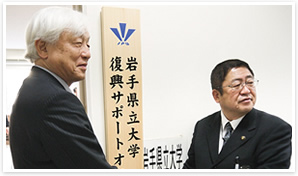
Opening Ceremony of the Taro Support Office (December 2012)
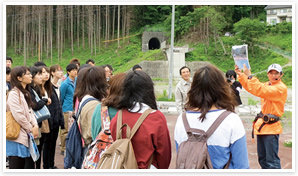
Iwate Prefectural University’s first-term local lecture on study of “Iwate” (Tanohata, June 2012)
In response to the extensive damage caused by the March 11, 2011 Great East Japan Earthquake and Tsunami and the environmental changes that accompanied it, the faculty and students of Iwate Prefectural University continue to support disaster recovery and reconstruction efforts.
Iwate Prefectural University has opened two support offices as bases for carrying out activities in support of reconstruction in the coastal regions: the Iwate Prefectural University Taro Reconstruction Support Office at the Taro General Office in Miyako in December 2012 and the Iwate Prefectural University Kamaishi Reconstruction Support Office at the Kamaishi-Ofunato Industrial Training Center in Hirata, Kamaishi in May 2013. These experimental base stations, whose information and telecommunications infrastructure stays connected even during a large-scale disaster, not only secure satellite information transmission links, but also serve as bases for faculty members’ research activities and support of reconstruction efforts in the field, students volunteer activities, and so on.
Since the 2011 establishment of the Disaster Reconstruction Support Center, a reconstruction support institution of Iwate Prefectural University, we continue provide many kinds of support, such as obtaining volunteer insurance, assistance with expenses, loans of necessary goods, etc., for the voluntary reconstruction support activities of our faculty and students. We operated a volunteer bus eight times in 2012, and carried out reconstruction support activities in cooperation with Ohio University.
With Iwate Prefectural University taking the lead, the Iwate Higher Education Consortium, a collaboration between five universities in the prefecture offering joint classes on the study of “Iwate”, implemented a program with the theme “Considering the reconstruction of Iwate: Getting to know Iwate in Sanriku and Hiraizumi” in the 2012 academic year. Through classes held 15 times each in the first and second terms, we deepened students’ learning about the prefecture’s reconstruction and its attractions.
While collaborating with local regions on activities to support areas affected by the disaster, we are also focusing on reconstruction education, and will continue to offer support that leads to a better future.






